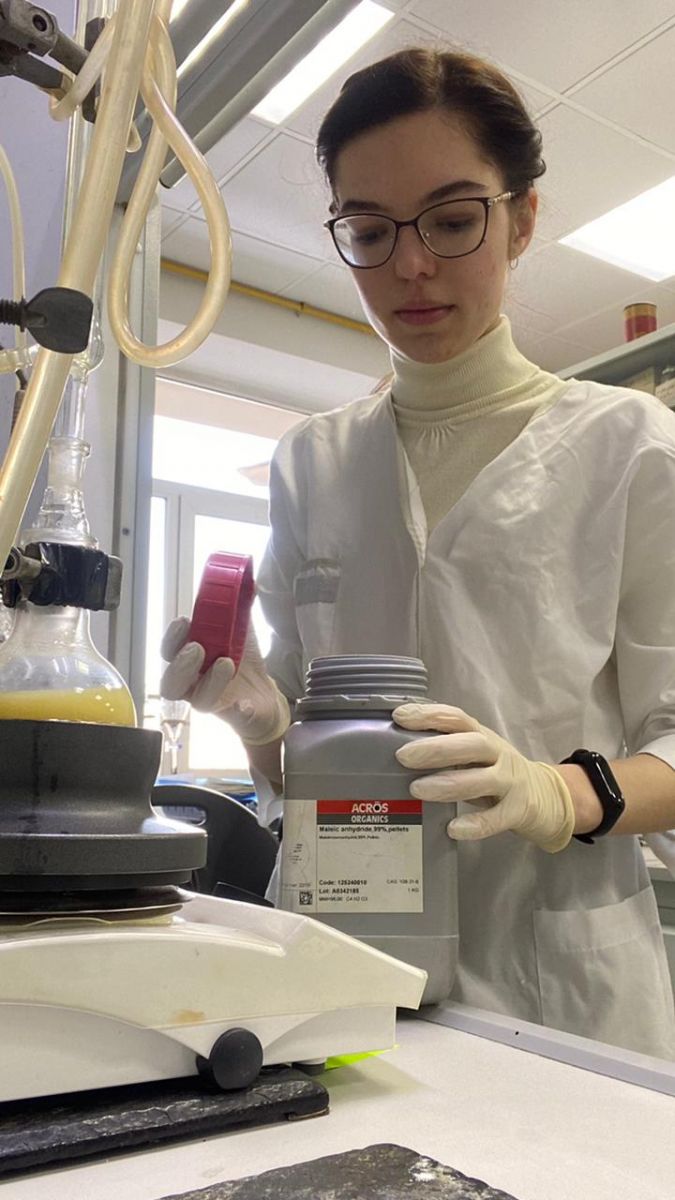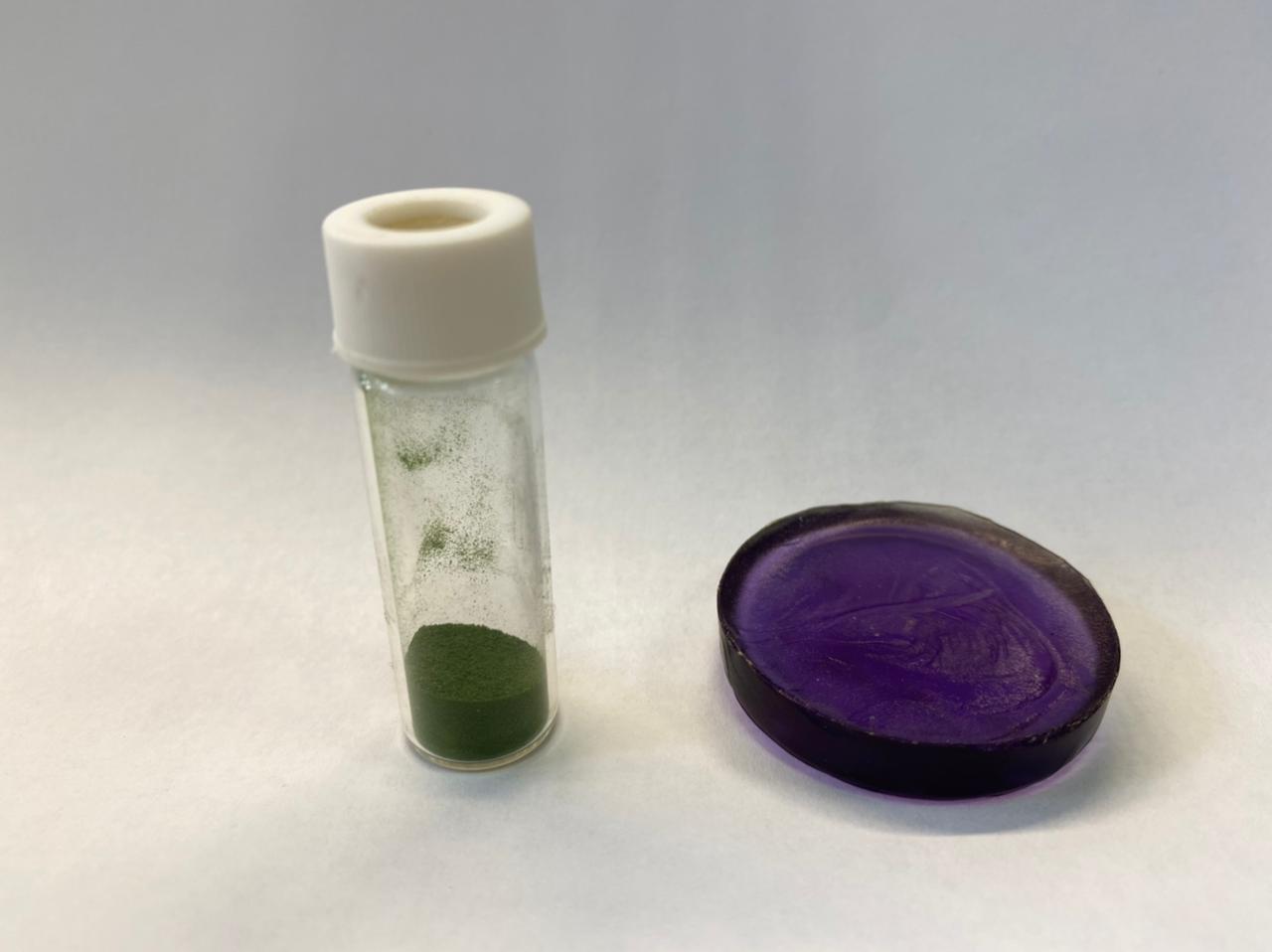“Nowadays you’ll rarely see a student who is truly enjoying working ona coursepaper or diploma. I’m exactly this student!” says Alexandra Antonova, a student of the Faculty of Science
Alexandra, why did you choose RUDN?
My friend recommended RUDN to me. He told me that RUDN paid much attention to practical work. My friend is working for scientific laboratories of educational organizations and also took part in research with RUDN scientists.
Was it difficult to study chemistry at school?
I became interested in this subject almost immediately once it appeared in our schedule. The periodic table, valence tables, chemical lattices… My interest became so strong that I even transferred to a chemistry-oriented school. The more I was studying the more interesting it was, but it’s impossible to know everything. I’ve been learning chemistry for 7 years already and I’m still dealing with difficulties. But that’s exactly what appeals to me – to learn something new, to overcome difficult moments, to find solutions and to experiment.
Many people have troubles with the Periodic system, but that’s not the most difficult thing, actually. I want to tell a little secret to all people who have just started studying chemistry – in most cases there is an opportunity to use the Periodic table during exams.
Why did you pick up exactly chemistry, not physics or mathematics?
Practical work, an opportunity to make something new with my own hands, to do laboratory work and to experiment – these are the things which I like. Nowadays you’ll rarely see a student who is truly enjoying working on a coursepaper or diploma. I’m exactly this student! I love scientific literature; I enjoy reading, writing and getting new information. The most favourite thing is to link theory with practice. It’s an unforgettable experience when the way you’re making something is much better than its description in the scientific literature. Chemistry turns into a completely different thing once it falls into the hands of a human.
You are researching the topic: “Synthesis on the basis of NHC-carbenium ligands of new ruthenium complexes and their usage in the reactions of metathesis”. For non-chemists it only sounds like a set of confusing terms. Can you explain that in simple words?
We are researching and discovering characteristic of ruthenium catalysts for the metathesis reaction.
- Ruthenium is an expensive metal. It’s necessary to work accurately with it because the work requires many different stages.
- We are making catalysts cheaper and more accessible. A catalysts is a chemical which accelerates reactions, but isn’t spent during them. In the sphere of organic synthesis, nowadays it’s popular to use catalysts which are based on various types of metals – in order to get polymers and biologically active molecules, for example. They can be used for synthesis of biologically active molecules. The latter can be used in pharmacy.
- NHC-ligand is a part of a catalyst which maintains its stability. It’s necessary to point out such details at the beginning of the work. It helps us to understand what we are going to deal with.
- Metathesis is a chemical reaction for which we are getting ruthenium catalysts. We have a beautiful explanation for this process. Metathesis resembles a dance of two couples who swap partners while dancing. Hands resemble chemical connections, and dancers themselves resemble chemical substituents. Three researchers received the Nobel Prize for promoting the metathesis method in organic synthesis in 2005. This theme is quite popular and many researches on it are being published almost every day. It also touches upon the subject of petrochemistry which a buzz word for all of us.

Why did you choose this topic?
I started studying organic synthesis when I was getting my bachelor’s degree. That time, using catalysts of metathesis reaction which were produced in our laboratory, I got my first molecule which hadn’t been described before. This topic is still a great field for scientific research.
You are really enjoying writing your works and publishing articles. What motivates you?
Firstly, the support of our university. Here you have an opportunity to realize yourself in science abroad. Our laboratory colleagues have been on internships abroad many times. Secondly, our research supervisor Fedor Ivanovich Zubkov, who really wants his students to be competitive not only among the Russian scientists, but also worldwide.
Tell us more about laboratory work.
A chemist works simultaneously with theory and practice – we get information from specialized literature and implement it in a laboratory. I published two new articles at the end of last year. The first one was on the catalyst synthesis, the second one – on its usage. I’m working together with my groupmates and juniors. Our principal investigator controls our work – he teaches us which things are allowed and which are not, commends us or scolds us, helps us to understand the intricacies.
Our organic synthesis laboratory also studies heterocycle chemistry and Diels–Alder reactions. When we are talking about the organic chemistry, we are mostly focusing on two elements – carbon and hydrogen, but organic molecules also contain other elements – oxygen, nitrogen and sulphur. Carbon atoms gather into different cycles. If a cycle contains any other atom (not carbon or hydrogen), this chemical compound can be called heterocyclic. Diels–Alder reaction is a powerful reaction which allows getting heterocycles from simple and accessible substances. This reaction often takes place in soft conditions with good efficiency and gives an opportunity to get biologically active molecules.
When people are talking about “experiments”, they always imagine bright flashes and colourful liquids. What really happens?
Experiments are an integral part of synthetic chemist’s work. We were warned that liquids are often of boring colours and don’t smell well. I don’t agree with that at all. Sometimes it happens that I work with “unpleasant” substances, but there are much more beautiful and wonderful moments in organic synthesis. Our ruthenium-based catalysts are of emerald-green colour. I love the synthetic part of our work. It’s an incredible process when you are making a difficult molecule out of available and simple pieces. It’s mesmerizing – to see a substance which has never been discovered before.
How do you manage to reconcile academic activity, studies and work?
My studies and my hobbies are my work. Furthermore, the laboratory is located in the same place where I usually study – in the same building in Ordzhonikidze Street. In the morning I study, then I have lunch and go to the laboratory. Sometimes I have some time left for practice when I have a break. Magistracy doesn’t exert much pressure comparing to the bachelor’s program. We are given time for research.
Which characteristics are important for a scientist?
Accuracy, attentiveness and responsibility. The skill to delve into the task also helps. You can boost these skills yourself if you have a desire. For many people meticulousness and special attention to details are intimidating, and not everyone can acquire these skills immediately. But I believe that all students who come to the laboratory have an opportunity to graduate and become good specialists if they have a strong desire.
How do you deal with fatigue?
I don’t get tired at all. My speciality is not monotonous – you always have an opportunity to switch from one task to another. If you are tired of synthesis, you can work with different devices and computer then. If you get tired even of this – read scientific literature. Sometimes I work 14 hours a day. I admit it’s not easy to arrive at 8 a.m. and then get back home at 10 p.m. These are the moments when I understand that I need some rest, but I have never thought of giving everything up. I can’t imagine living without a long to-do list. Sometimes I even miss work atmosphere when I’m at home.
The interview was conducted by Alina Te
RUDN University staff and alumni received state and departmental awards at the State Kremlin Palace during a festive concert in honor of RUDN 65th anniversary.
An architectural-landscape project by a 5th-year student of RUDN has been shortlisted for the annual International Professional ADD AWARDS 2024 for architects, designers, and developers in the “Urban Environment” category.
RUDN University employees’ work and contribution to the development of the university cannot go unappreciated. The Ministry of Science and Higher Education of Russia recognizes talented university employees and present them with various departmental and state awards.
.jpeg)
.jpeg)
